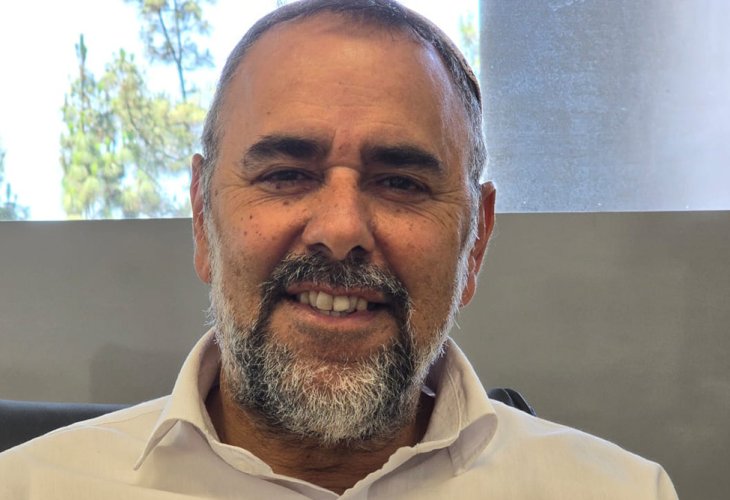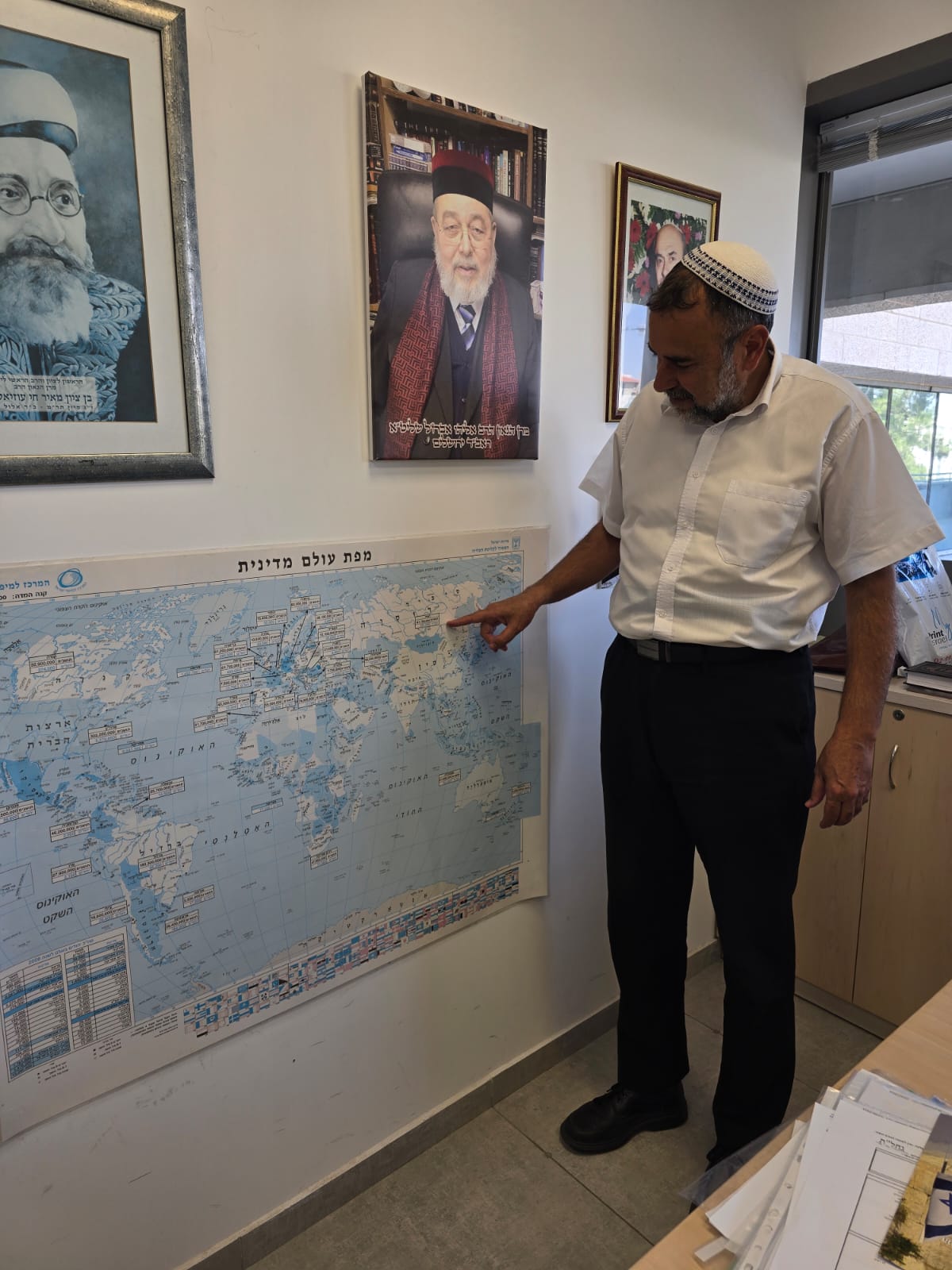Unlocking Jewish Identity: Inside the Work of Rabbi Eliyahu Maimon
Discover the delicate process of verifying Jewish identity with Rabbi Maimon, and learn how the Rabbinical Court tackles identity fraud.
 Rabbi Eliyahu Maimon (Credit: Rabbinical Courts Public Relations)
Rabbi Eliyahu Maimon (Credit: Rabbinical Courts Public Relations)According to information from the Rabbinical Courts in Israel, in 2023, final decisions on Jewish identity verification were made in 2,171 cases.
Every year, thousands reach out to the rabbinate to clarify their Jewish identity. Various reasons might lead non-Jews to seek a certificate of Jewishness, primarily to integrate within the Jewish community in Israel, facilitating their children's future marriages without issues. Additionally, aspiring to settle in a developed country like Israel that offers full citizen benefits. The rabbinate must ensure that those seeking verification are genuinely Jewish to prevent assimilation, God forbid.
We sat down with Rabbi Eliyahu Maimon, Head of the Departments of Agunot and Jewish Identity Verification at the Rabbinical Courts, to understand how they delicately handle Jewish identity verification, their methods for spotting fraudulent claims, and more.
"Easing a Sensitive Process"
Firstly, who seeks to verify their Jewish identity?
"Anyone married in countries lacking an established rabbinical system, such as the former Soviet Union, India, or Ethiopia," begins Rabbi Maimon. "For those from well-established communities, we can rely on their mother's ketubah and other Jewish sources, but for others, verification is necessary.
"We prefer individuals to proactively seek verification, but often they aren't aware of any issues until they marry, and the marriage registrar informs them they need verification."
How do you handle verification with sensitivity and kindness?
"We recognize these are people going through a complex stage in their lives, managing wedding plans and family expectations. Suddenly, verifying their Jewishness is added to the mix. It's sensitive because they are confident in their Jewishness, and then this 'case' is dropped on them. Therefore, we created a special system where each person receives a code and personal service from a representative who calmly explains the process, which typically takes an average of thirty days, often quicker."
Rabbi Maimon emphasizes that "the process is mostly online, and there's no cost involved. We save applicants workdays and ensure identity verification happens within a day. Once all documents are submitted, the person meets with a Jewish verification expert for about forty minutes and then receives approval by mail.
"Moreover, to ease their burden, we ask them to bring their siblings' birth certificates, and we issue them Jewishness certificates as well."
 (Credit: Rabbinical Courts Public Relations)
(Credit: Rabbinical Courts Public Relations)How many applicants turn out not to be Jewish?
"Less than three percent, most being those who abandoned the process midway. This suggests only about one percent are found to be non-Jewish."
"Few Attempt Fraud"
At this stage, Rabbi Maimon explains in detail how Jewish identity is verified: "This is a profession just like any other. One must understand the history of the countries in question. The Commonwealth of Independent States is one area, Europe another, and Eastern Europe is yet another. We have specialists in each area who must know the regional history and understand relevant periods and manuscripts.
"A good Jewish identity verifier can deduce authenticity even without documents, through family history and conversation," notes Rabbi Maimon. "Family photos, birth certificates, educational records, and any item that may serve as proof reveal whether the individual before us is Jewish."
What if there are no documents? If everything is lost over the years?
"Even for those without living parents or any documents, we have ways to obtain materials from their countries of origin. Additionally, in such cases, we rely on DNA testing."
How many attempt to fake their Jewishness?
"Very few," Rabbi Maimon replies.
And why would they do so?
"They want verification of Jewish status. In the past, Jews sought to blend with non-Jews abroad, yet here in Israel, everyone strives to be Jewish. Initially, they seek eligibility for immigration but also recognize they cannot marry under Jewish law, which concerns them. Today, marrying according to tradition is something the entire Israeli society desires, both secular and traditional. This is important to families and to them personally."
How do you spot forgers?
"There are various types of forgeries. If it's a story, you can often tell if it’s credible just by listening. Sometimes it's not a story but a forged document. In such cases, we work with the Israeli police's document lab, which provides us with expert opinions on fraudulent documents.
"Sometimes all documents and stories are correct, except for one differing detail: the forger took someone else's story, a 'borrowed identity.' We do everything necessary to verify appropriately, thus identifying forgers."
An Emotional Full Circle
A story the rabbi will never forget?
"There was a woman here undergoing the Jewish identity verification process, and unfortunately, we couldn't verify her Jewishness. Nothing we tried succeeded. We didn’t have a shred of information to definitively confirm her Jewish status.
"One day, we learned she passed away. Her daughter came and said her mother's last wish was to be buried in a Jewish cemetery. We understood that if, on their deathbed, someone desired a Jewish burial, it was deep and genuine. We turned the world upside down, reached out to various archives, and by God's grace, within twenty-four hours, we found the crucial evidence proving the deceased was Jewish, allowing us to bury her in a Jewish cemetery.
"Interestingly," continues Rabbi Maimon, "this finding enabled her daughter to marry within Jewish law, where her help for her mother, in turn, helped her."
This work carries immense purpose...
"Indeed, we always walk the fine line of 'not forsaking any soul.' We must not detach any Jew from their roots, hence we exhaust all imaginable resources. Often, we prove Jewishness to those unaware of it. This is an immensely fulfilling and challenging role within governmental service, and truly a mission.
"We acknowledge the sensitivity of this process," emphasizes the Rabbi, "and thus we strive to ease the process for identity verifiers. At the Rabbinical Court, we don't pursue people for divorces or inheritances, but only in matters of Jewish identity verification do we reach out: verify now for a three-year-old or an eighty-year-old grandmother. Let's prove their Jewishness today to ease their future."
Finally, Rabbi Maimon mentions: "We have software called 'Mayanot.' Everyone verifying their Jewishness is entered into this system. It means that even in 500 years, without grandmother or documents, we will have a genealogical tree proving these individuals are connected to the Jewish people. It's a national project, in my opinion."

